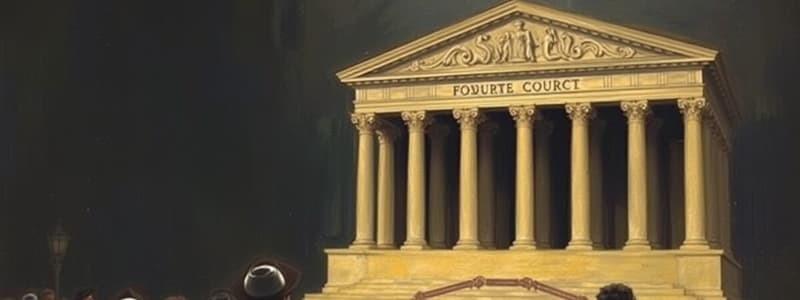Podcast
Questions and Answers
What was the primary issue in the case of Katz v US?
What was the primary issue in the case of Katz v US?
- Privacy violation (correct)
- Gambling
- Murder
- Drugs
What did the Supreme Court rule in Katz v US?
What did the Supreme Court rule in Katz v US?
What a person knowingly exposes to the public is not private.
What was the outcome of Mincey v Arizona?
What was the outcome of Mincey v Arizona?
- Search and seizure lawful
- Emergency situation confirmed
- Violation of the 4th and 14th amendments (correct)
- Murder Scene Exception upheld
What does the ruling in Thompson v Louisiana state about general exploratory searches?
What does the ruling in Thompson v Louisiana state about general exploratory searches?
In Michigan v Tyler, the court ruled that expectation of privacy is diminished during official entries into commercial buildings.
In Michigan v Tyler, the court ruled that expectation of privacy is diminished during official entries into commercial buildings.
What is required in Michigan v Clifford regarding fire investigations?
What is required in Michigan v Clifford regarding fire investigations?
What exception does Carroll v US establish for searching vehicles?
What exception does Carroll v US establish for searching vehicles?
What does the outcome of Johnson v US say about who determines the right to search?
What does the outcome of Johnson v US say about who determines the right to search?
What did the ruling in Illinois v Gates establish about the reliability of informants?
What did the ruling in Illinois v Gates establish about the reliability of informants?
What is the standard for a waiver of privacy in the case of Bumper v North Carolina?
What is the standard for a waiver of privacy in the case of Bumper v North Carolina?
What does Nix v Williams address in terms of primary evidence?
What does Nix v Williams address in terms of primary evidence?
Flashcards are hidden until you start studying
Study Notes
Katz v US
- Katz was using a phone booth for gambling when the government listened to his call, leading to his arrest.
- Supreme Court ruled that what a person knowingly exposes to the public is not protected; privacy may apply in public areas.
Mincey v Arizona
- Following a drug arrest, a fatal gun battle led to a four-day warrantless search of Mincey's home.
- The court determined the "Murder Scene Exception" to be inconsistent with 4th and 14th amendments, emphasizing no emergency justification for warrantless searches.
Thompson v Louisiana
- Police conducted an exploratory search of a residence after the wife killed her husband and attempted suicide, leading to illegal evidence seizure.
- The court found that the "general exploratory search" violated the 4th amendment, resulting in the acquittal of the mother.
Michigan v Tyler
- Tyler hired an individual to burn down his store for insurance, which led to his arrest.
- Investigators need a warrant to enter commercial buildings for fire investigations; expectation of privacy remains intact.
Michigan v Clifford
- Fires on residential properties require warrant protections under the 4th amendment.
- Homeowners keep privacy expectations even in fire-damaged homes, necessitating a criminal search warrant to seize evidence.
Carroll v US
- Established the motor vehicle emergency exception allowing searches based on probable cause without a warrant.
Brinegar v US
- Differentiated privacy levels between vehicles and private homes, stating vehicles have a slightly reduced privacy expectation.
Johnson v US
- Emphasized that the right to privacy and search needs judicial determination rather than police discretion.
Coolidge v New Hampshire
- Found that police or attorney general's involvement fails neutrality in determining probable cause for warrants under the 4th amendment.
Connally v Georgia
- Ruled that a payment structure for Justices of the Peace violated the 4th amendment’s requirement for neutral magistrates.
Illinois v Gates
- Police acted on an anonymous tip about drug trafficking; the search warrant application was based on corroborated facts.
- Introduced a two-pronged test assessing the informant's basis of knowledge and reliability.
Wilson v Arkansas
- Addressed the "knock and announce" rule, indicating the right to privacy and statutory validity.
US v Banks
- Outlined requirements for “knock and announce” and allowed for exigent circumstances.
US v Brown
- Introduced a six-factor test assessing the seriousness of the crime and circumstances surrounding police entry.
Buie v Maryland
- After an armed robbery, a plain view seizure of criminal evidence was deemed permissible under suspicion circumstances post-arrest.
US v Rubin
- Asserted that imminent evidence destruction justifies search without requiring actual knowledge of the destruction.
Schneckloth v Bustamonte
- Established that consent for searches must be voluntary and involve lawful control of the property.
Bumper v North Carolina
- Found that coerced consent due to police warrant claims violates voluntary consent standards.
Nix v Williams
- Addressed the unfolding of evidence during investigative conversations leading to locating a victim's body, focusing on independent investigations.
California v Greenwood
- Garbage placed outside for collection loses expectation of privacy; police may seize it from trash collectors.
Nardone v US
- Labeled illegally obtained evidence as "fruits of the poisonous tree," unadmissible in prosecutions.
Wong Sun v US
- Established that evidence purged from unlawful search could still be admissible if obtained independently.
US v Leon
- Introduced the good faith exception where evidence is not suppressed if investigators acted in good faith despite warrant issues.
Mapp v Ohio
- Highlighted that illegally seized evidence violates the 4th and 14th amendments, affecting both state and federal prosecutions, prompting review by the Supreme Court.
Studying That Suits You
Use AI to generate personalized quizzes and flashcards to suit your learning preferences.



